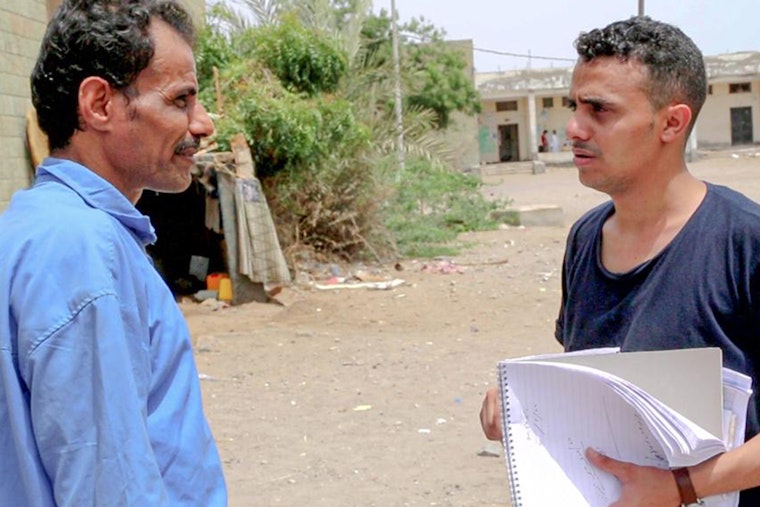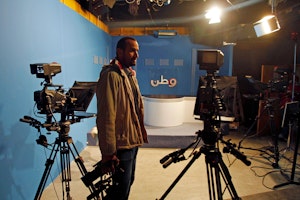This Reporter Helped Free 1,600 Yemeni Prisoners
By Rawan Damen

I work at Arab Reporters for Investigative Journalism (ARIJ). It is a distinctive venture in the Arab world: the first media organization in the region dedicated to advancing investigative journalism. Founded in Amman in 2005 and working across 16 countries, ARIJ trains and coaches Arab journalists and helps them network with regional and international media outlets. The organization was established to uphold the role of in-depth journalism in unearthing truths and harnessing key values of open society: accountability and justice.
Last year, ARIJ’s hard work paid off in exceptional ways when an investigative report written by one of its young Yemeni trainees, reporter Wael Sharha, contributed to the release of 1,600 prisoners across four Yemeni cities.
The report, entitled Eternal Hostages, delved into the state of detainees ensnared in the Yemeni courts’ lengthy litigation processes. For reasons as simple as a dearth of judges or a shortage of handcuffs and vehicles to transport people to courts in the Arab world’s most economically struggling country, prisoners, who are not political detainees, can spend years forgotten in prison cells, awaiting justice. Some were being held for petty crimes, others for more significant offenses; all were locked up well past their release dates, while prosecutors and prison administrators argued over who was to blame for the situation.
Sharha began his investigations in April 2018. Hassan Salem, one of the prisoners interviewed for the report, was jailed in 2009, at the age of 32, for unlawful possession of items belonging to his brother. Yemen’s South Hudaydah court sentenced him to one year in jail. He was incarcerated for over ten years while awaiting appeal.
“A year after I entered prison, I appealed the verdict in a timely manner, and I have not been called to trial on appeal for more than ten years,” he told Sharha. “I miss my parents and my family, and I do not know anything about them, and I wonder if they are still alive? I am here alone and have nothing left but God.”

Sharha’s investigations focused on four prisons in North Yemen—the part of the country from which he hails—in the cities of Al Hudaydah, Ibb, Amran, and Sanaa. For months, Sharha was not allowed into any of the facilities, but after a series of consultations with the head of the prison administration at the Central Prison in Hudaydah, he was eventually allowed in. At one point while visiting a prison in Sanaa, a supervisor detained him for four hours.
“Completing this kind of investigation was almost impossible in a country torn apart by wars and divisions,” said Sharha. “Work on the investigation lasted one year and four months and was plagued by difficulties and threats, in addition to the lack of information or people withholding it.” Following his fieldwork, Sharha spent months writing, editing, and fact-checking the report before publishing it in March 2020.
Many journalists have been assaulted, threatened, or killed while reporting in Yemen. Not only is their safety at stake, but their day-to-day work involves navigating difficulties such as accessing the internet, transport, and electricity.
“Yemen is one of the most dangerous countries for journalists,” said Anthony Bellanger, general secretary of the International Federation of Journalists. “The bloody conflict, the political instability, the multiplicity of actors in the absence of state authority but also the growing hostility towards the press and journalists have contributed to enshrining the impunity of journalists’ killers, attackers and harassers. Doing investigative journalism in such an environment is truly impressive.”
From the moment Sharha presented his investigative idea to ARIJ, my colleagues and I helped him develop his story pitch and plan his fieldwork tasks, research, logistics, fact-checking, legal screening, and media networking. Sharha was enrolled in ARIJ’s digital and security clinics to ensure that he was psychologically equipped to navigate safety and security challenges. As ARIJ is a training entity and not a publishing platform, the final report was shared with a regional media outlet to publish.
The report was picked up by the official Yemeni state paper Al Thawra (The Revolution), for which Sharha had previously worked. Four weeks later, all of us at ARIJ were surprised to read in the local Yemeni papers that the “eternal hostages” cases had been investigated. The result: of the prisoners across 23 central and remand prisons in 14 governorates in North Yemen, 1,600 of them who had completed their sentences were released.
The Yemeni Supreme Judicial Council took ARIJ’s investigation into consideration and endorsed filing a disciplinary case against two judges and referred them to the Accountability Council, based on the charges filed against them by the Judicial Inspection Authority.
“We ourselves couldn’t believe it,” said Mohammed Komani, himself a Yemeni reporter as well as an ARIJ media coach. “We know how difficult prison conditions are and understand the lofty meaning of freedom and how hard it is to have it stripped away from you unfairly. We were 25 staff members at ARIJ’s office in Amman ecstatic that we could make a real contribution to people’s lives. It was a big boost.”
Sharha’s report won ARIJ’s Bronze award in December 2020.
Over the last 15 years, more than 3500 Arab journalists, editors, and fact-checkers were trained in investigative journalism by ARIJ, producing over 650 investigations, dozens of them award-winning. From harsh punitive measures implemented against schoolchildren in Sudan, to factories polluting Mauritania, young Arab women and men are trained by ARIJ offline and online to uncover a vast array of important stories. As part of its commitment to press freedom and information democracy, the Open Society Foundations have been supporting ARIJ for 13 years.
The sterling success of Sharha’s report confirms what ARIJ has always known to be true and what has motivated its passionate foray into this unique field in the Arab world: that investigative journalism serves key democratic functions, moving truths from obscurity to light, and helping societies improve the welfare of their citizens. We must all champion the virtues of investigative journalism.
Rawan Damen is Director General of Arab Reporters for Investigative Journalism

